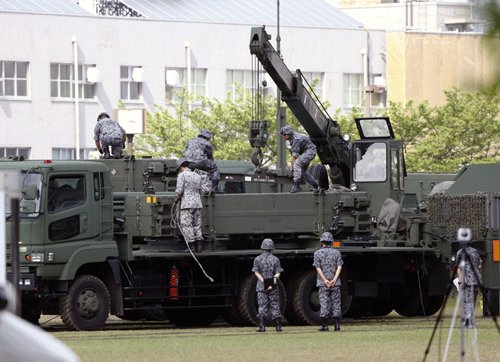North Korea launched what appeared to be two Musudan intermediate-range ballistic missiles (IRBMs) from its east coast early Wednesday morning, but the first test-firing is assumed to have been unsuccessful, the Joint Chiefs of Staff said.
At around 5:58 a.m., North Korea fired off what is presumed to be a Musudan missile from near Wonsan along the east coast, but the launch seems to have ended in failure, the JCS said, providing no further details.

About two hours later at 8:05 a.m., the North launched another missile presumed to be the same type of IRBM from the same area, the JCS noted.
"The second Musudan-like missile flew about 400 km," the JCS said without elaborating on whether it was a success. "South Korea and the United States (militaries) are carrying out an in-depth analysis on it."
Military sources added the first missile has been detected to have burst into pieces in the air after flying some 150 km after launch.
The sources said North Korean leader Kim is believed to have watched the early morning launch in person.
The latest launches followed North Korea's four back-to-back failures to launch the Musudan missile.
On April 15, North Korea first test-fired the Musudan missile as the country kickstarted its ballistic missile tests and development following North Korean leader Kim Jong-un's much-publicized orders to accelerate the country's nuclear and missile sophistication the previous month.
North Korea has deployed some 50 Musudan missiles with its forces since 2007, but none of them had been tested before April.
With an estimated range of some 3,000 to 4,000 km, the Musudan missile could theoretically reach any target in Japan and strike as far away as the U.S. territory of Guam.
On Tuesday, the JCS said it was closely monitoring the North after detecting signs there of preparations for a missile launch.
"North Korea's obsession with the Musudan missile derives from its desire to show off a missile program capable of striking the U.S.," one military official said, asking not to be named. Combined with North Korea's submarine-launched ballistic missile program, an operational Musudan IRBM can pose "considerable threats" the official said.
The latest military provocation by North Korea is sure to further drive a wedge between the Koreas at a time when Pyongyang is unsuccessfully trying to engage Seoul in talks.
Since North Korean leader Kim Jong-un officially stated the need to hold military dialogue with South Korea during the country's rare party congress in early May, Pyongyang has made several offers for talks.
South Korea has, however, dismissed them as insincere gestures that have been accompanied by North Korea's continuing military provocations in defiance of the United Nations Security Council resolutions.
Under a series of U.N. resolutions, North Korea is banned from nuclear and ballistic missile-related activities.
"North Korea has tried five launches of missiles presumed to be Musudan so far this year, but all of them were unsuccessful," South Korea's defense ministry said, following the botched test-fire earlier in the day,
"This is a clear violation of U.N. resolutions that prohibit any activities involving ballistic missile technology," the ministry said, denouncing the launch.
A day earlier, South Korea warned that action would be taken at the international level should the North launch another missile.
"This would further isolate the North from the international community, and in such an event, our government plans to take steps, including at the U.N. together with our allies," ministry spokesman Cho June-hyuck said during a regular press briefing. (Yonhap)








![[KH Explains] Hyundai-backed Motional’s struggles deepen as Tesla eyes August robotaxi debut](http://res.heraldm.com/phpwas/restmb_idxmake.php?idx=644&simg=/content/image/2024/05/16/20240516050605_0.jpg&u=20240516155018)









